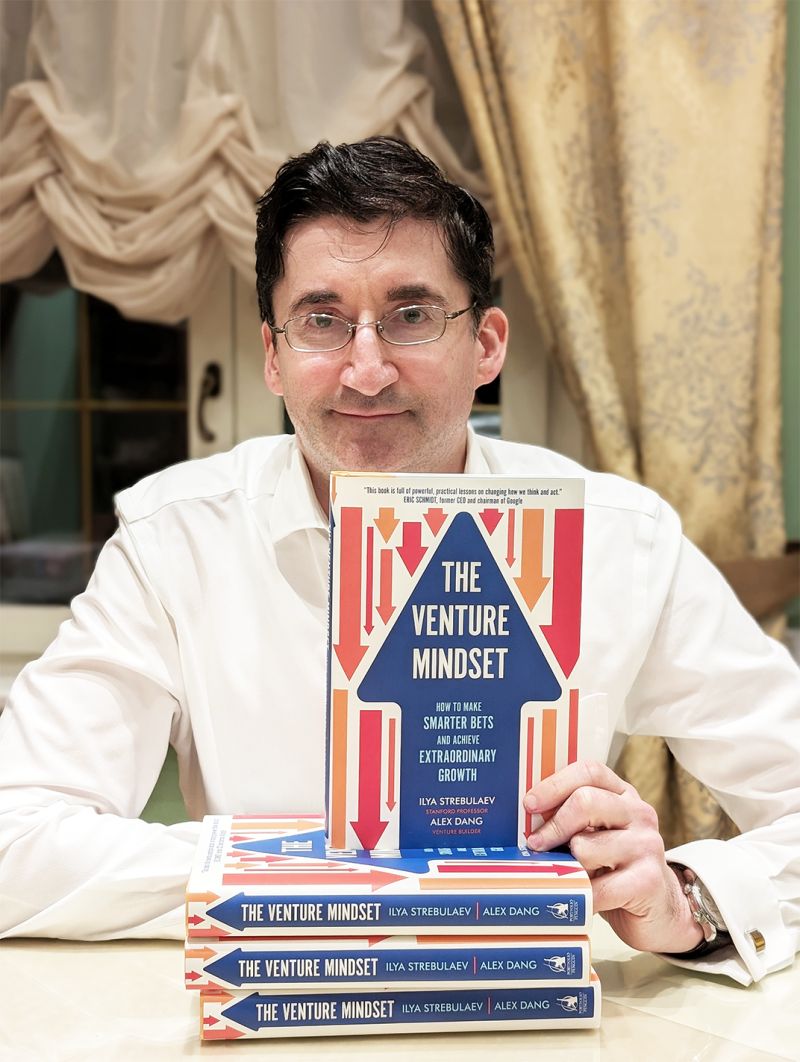Stanford professor Ilya Stebulaev has a step-by-step guide to get companies into the venture mindset. Step one: if you want a home run, you can't be afraid of striking out.

Most large corporations still don’t understand venture investing. Many of them have realised that they need to tap into the innovation from the startup ecosystem, and a majority now have some kind of strategy to invest in or engage with emerging companies. But these can be ad hoc and poorly designed, says Ilya Strebulaev, professor of private equity and finance at Stanford graduate school of business. And corporate executives still struggle to understand how startup investing works.
“About 60% plus of the leaders of corporate VCs units that I spoke to in my research — about 150 of them — said their parents executives don’t really understand venture,” he tells GCV.

So Strebulaev is on a mission to help educate corporate executives through a new book, The Venture Mindset.
Based on his 20 years of research at Stanford and working with hundreds of companies over his career, Strebulaev has examined how the most successful venture capitalists make decisions.
“The venture mindset really is a new mental model to evaluate and make decisions in the innovation driven world,” he says.
He distilled these into to nine principles, which are presented in the book with examples and, most importantly, with specific actions that corporate decision makers can take.
“My goal is not just to tell a story. The book is very practical,” says Strebulaev. “That is important.”
He shared some of the principles with GCV to give us a taste:
Don’t be afraid of striking out
“The first principle that drives the venture mindset is: home runs matter, strikeouts don’t. The idea behind this is that smart venture capitalists, investors and smart investors within companies try to catch outliers,” says Strebulaev. “Catching outliers can happen only if you also accept strikeouts.”
It is important to convince corporate decision-makers that they need to accept failure as part of the venturing process. Many corporations will pay lip service to the idea of accepting failure but still demand low levels of risk from their startup portfolios. The safe option, however, will never get them to discover the truly transformational startups.
Forget unanimity
The other tip for catching outliers is to let go of the idea that everyone on the investment committee needs to agree on every investment.
“What I found in my research was that VC firms who insist that every single person around the table is comfortable or enthusiastic about an investment decision are, on average, less successful,” says Strebulaev.
He advises companies to allow for some degree of dissent and suggest ways to structure meetings to encourage a robust exchange of views.
“In every single discussion, juniors should speak first. You’ll see the change right away.”
“In every single discussion, juniors should speak first. This is very easy to implement, and you’ll see the change right away,” he says. Before every meeting give people an opportunity to provide feedback anonymously, and that feedback should be distributed before the meeting. All of that should improve the quality of decisions.
Smart companies also appoint a devil’s advocate whose job it is to speak against the investment opportunity. And when it comes to voting on the decision to invest of not, it is better to have a system where the investment can go ahead even if one or two people disagree.
Strebulaev says it can also be worth creating a small seed fund where less stringent approvals are needed to go ahead with small investments.
Create an anti-portfolio
Another good way for a company to assess the quality of its decision-making is to create an “anti-portfolio”, or a list of the investment opportunities it declines. It is important for investors to say no — possibly a 100 times for every one investment they go ahead with. But it is also worth keeping track of the opportunities that were passed up and see how they perform.
“Think about the deals that you considered, that you had access to but which you decided not to invest in,” says Strebulaev. If these startups end up performing better than the portfolio of companies you did invest in, it is worth looking at your decision-making process to see what is going wrong.
“I recently worked with a big VC firm whose anti-portfolio was more successful than its portfolio. The question was, why? Then we figured out that that is because of the way they insisted on enthusiasm for every deal from every single person around the table.”
CVC investors should buy this book for corporate C-suite executives
“The book is for corporate venture experts, but also really, for corporate decision-makers,” says Strebulaev. One corporate venture investor has bought 500 copies of the book to hand out to every corporate executive at the parent company. (If anyone would like to do the same, there is a link below for ordering and a discount for those who order more than 100 copies).
Strebulaev started the book in 2021, at the height of the startup boom. VC activity was high, and new corporate investment units were being created at a record rate. According to GCV’s data, more than 200 companies have created new venturing units since Strebulaev began researching the book.
“Everything was going well in the world, but not in the design of those corporate venture initiatives,” says Strebulaev. “I believe passionately in the importance of those initiatives for large companies, but I anticipated there would be a need for adjustments.”
That time for adjustments has now arrived as many CVC units, in the face of a tougher investment climate and inflationary pressures, have started to reassess their strategies. A handful of CVC units have closed recently, but many more will pivot or adjust. Strebulaev hopes his book will set them in the right direction more quickly.
Ilya Strebulaev’s book The Venture Mindset: How to Make Smarter Bets and Achieve Extraordinary Growth is available to order here. If you would like a bulk order of more than 25 copies please email the team at team@thevcmindset.com.

Maija Palmer
Maija Palmer is editor of Global Venturing and puts together the weekly email newsletter (sign up here for free).








